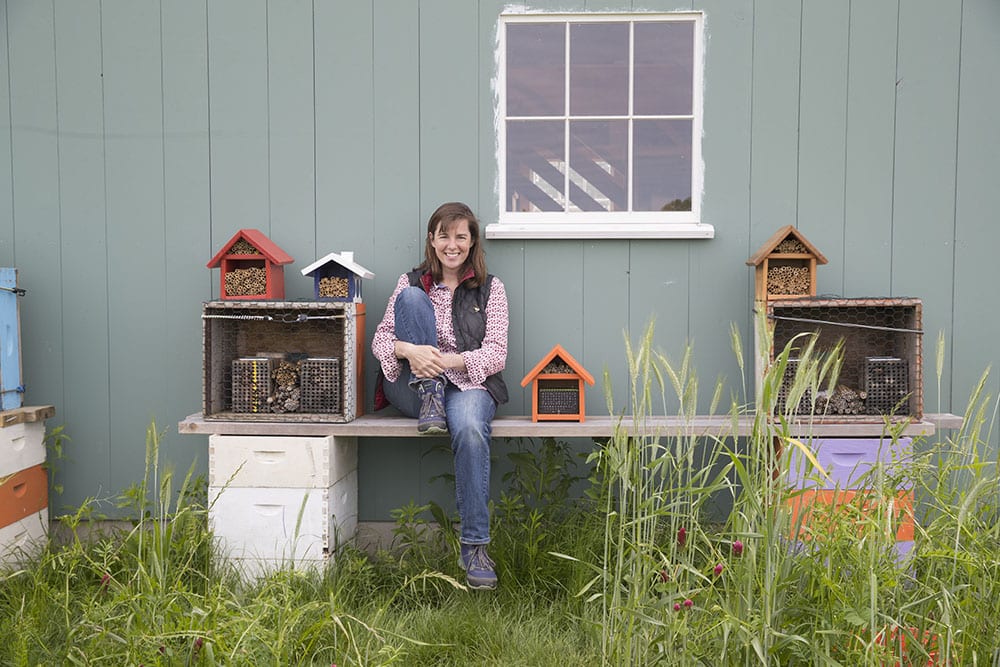Bees are considered the world’s most important pollinator of food crops. In fact, it’s estimated that one third of the food that we consume each day relies on pollination, mainly by bees. Alumna Laura Klahre, ’97, witnesses the importance of that very fact every day. Laura and her winemaker husband Adam Suprenant own Blossom Meadow Farm, in Southold, New York, where she grows strawberries, raspberries, and blueberries, and cover crops of turnips, canola, and buckwheat. While she got her start in farming with honeybees more than twenty years ago, none are found at the farm anymore. All crops are pollinated by native bees, including the gentle, easy-to-raise mason bee. Klahre is quick to point out that honeybees are an invasive species and that an overwhelming amount of evidence has proven their negative impact on the natural world. “In addition, native bees pollinate two to three times better than honeybees and the resulting fruit is heavier, more well-rounded, and higher quality,”said Klahre.

Bee rancher Laura Klahre sits by her mason bee cottages at Blossom Meadow Farm in Southold, Wednesday, May 24, 2017. Photo by Randee Daddona
Blossom Meadow Farm is well known for its red raspberry, black raspberry, strawberry and blueberry jams, as well as selling high-quality mason bee cocoons. Thanks to her efforts, more than 100 families have begun raising mason bees, also known as bee ranching.
Wine-lovers on Long Island’s East End may know Laura as the co-proprietor of Coffee Pot Cellars in Cutchogue, where she runs a Merlot for Monarchs campaign. As part of the campaign, the farm grows a butterfly milkweed plant (Asclepias tuberosa) for each bottle of merlot sold at the winery. She then works with libraries and Girl Scouts to plant and restore monarch butterfly habitat throughout Long Island in June of each year. “Monarch butterflies will only lay their eggs on milkweed and scientists estimate that more than 1.3 billion stems of milkweed will need to be restored for the species to bounce back,” said Klahre. Coffee Pot Cellars also showcases a Cyser, which is a hard cider made from apples pollinated by Klahre’s mason bees and that uses the traditional French Champagne sparkling wine method, méthode Champenoise.
On a cold, windy day in late March, it’s hard to imagine the farm abuzz with bees and brimming with the food they crave. Her husband will join her to tackle farm chores later in the day, but for now her only assistant is Beasley, a pug who follows her everywhere, silently.
Klahre’s farm is interlaced with trails of pollinator-friendly native perennials including blue giant hyssop, purple coneflower, wild quinine, sweet goldenrod, and common milkweed, and native shrubs including summersweet, beach plum and winterberry. The farm also features a large patch of managed grassland. “Seventy percent of bees live in the ground, so you have to give them a place to live,” she said.
“A large majority of bees and other insects are malnourished in today’s world. We need to plant more native trees, shrubs and flowers,” she said.
A marine environmental sciences major who earned her masters degree at Stony Brook, Laura said the switch to terrestrial ecology is not as big a leap as one might think.
“You’re dealing with the same ecological principles on land as under water,” she said. “Stony Brook helped me think critically and I take that information and apply it. I think it’s great that Stony Brook is raising awareness about how to help pollinators.”
Klahre credits her father with giving her a piece of timeless advice that now shapes her own philosophy and drive: “He told me ‘All you have in this world is your name so you had better make something good.’ ”
One taste of her red raspberry jam is all the proof you need that she heeded her dad’s counsel, and that the world is a better place thanks to pollinators.
— Glenn Jochum





You must be logged in to post a comment.